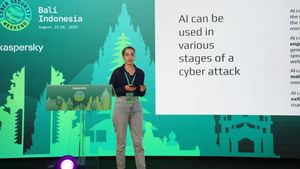JAKARTA - Not long ago, Kaspersky experts shared their analysis of the possible impact of Artificial Intelligence (AI), particularly the potential psychological hazards of this advanced technology.
According to Vitaly Kamluk, Head of Research Center for Asia Pacific, Research and Analysis Team Global (GReAT) at Kaspersky, as cybercriminals use AI to launch their malicious acts, they don't feel responsible for their impact.
Thus, this will result in what is called "supervising distancing syndrome" or suffering distance syndrome.
There is a suffering distance syndrome known among cybercriminals. Physically attacking someone on the highway causes criminals to be very stressed because they often see the suffering of their victims. However, that does not apply to cybercriminals who steal from victims they will never see," explained Kamluk.
VOIR éGALEMENT:
According to Kamluk, AI, which magically brings in money or illegal profits, will further obscure the criminal acts of cybercriminals, because they are not the only ones to blame, but AI.
Another psychological impact of AI that can affect the IT security team is "delegation of responsibility". As more and more processes and cybersecurity tools are automated to the network, humans may feel less responsible if cyber attacks occur, especially in the company's environment.
The intelligent defense system can be a scapegoat. In addition, the presence of fully independent autopilot reduces the attention of human control," he added.
The English, Chinese, Japanese, Arabic, and French versions are automatically generated by the AI. So there may still be inaccuracies in translating, please always see Indonesian as our main language. (system supported by DigitalSiber.id)













